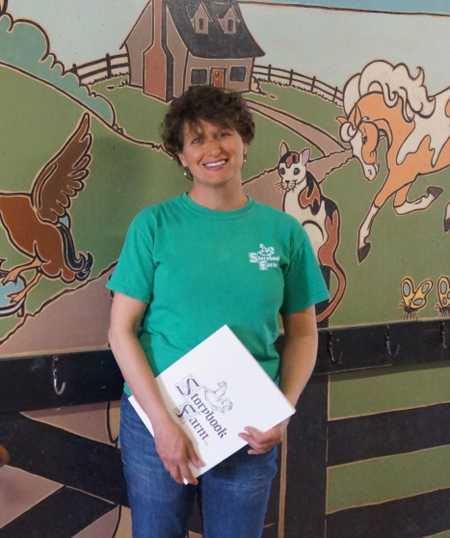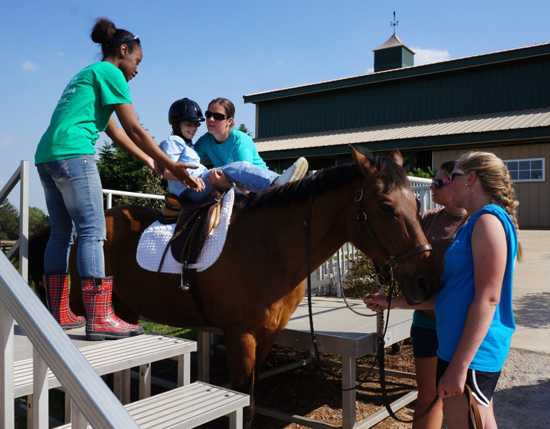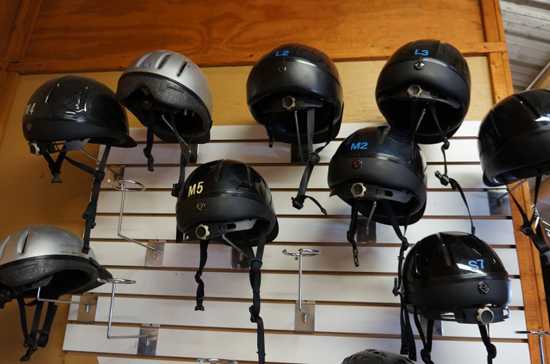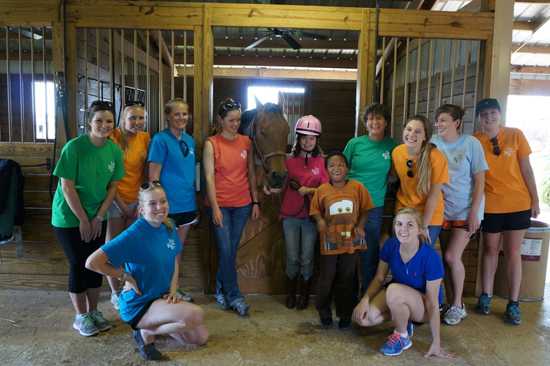Like Magic, Everyone is Equal On the Back of a Horse

Dena Little stands in front of a mural painted inside of the barn at Storybook Farm. Image courtesy of Rebecca Myers.
Just inside the Alabama state line is a magical place. A long, winding driveway ends at a big green barn. Horses named Mrs. Potts, Jack and the Beanstalk, and Captain Hook prance in pastures surrounded by rolling green hills, where children with various mental and physical disabilities find happiness, courage, and confidence.
Like a fairy tale
In 2002, Dena Little established Storybook Farm for the sole purpose of providing therapy for mentally, physically, and emotionally handicapped children of all ages. The riding therapy program has grown from just 3 riders to more than 800 children participating each year. The children, ranging in age from 2 years to early adulthood, could be experiencing anything from a recent death in the family to a battle with terminal illness. Because of her extensive volunteer network and strong supporters, Dena is able to offer therapy without charge. "We wanted to make sure that anyone in need could participate in this activity, and we take pride in being able to offer the service completely free," said Dena.
Children thrive

Volunteers help a rider onto one of the horses at Storybook Farm. Image courtesy of Rebecca Myers.
The charm of Storybook Farm casts a spell on the children from the moment Jack, the farm's liaison for the families, greets them at the barn door to the time they leave. His big smile radiates warmth and joy. As the children get ready for their ride, you can see their focus change from their handicap to their horse.
Each child is matched with a horse for the duration of the program, explained Dena. This gives children a sense of ownership with their horses. Dena's daughter Emma, who also volunteers at the farm, supports this bond by writing personalized letters from the horses to each child.
The farm offers semester-long classes in the spring, summer, and fall. Each week, the kids have 1 or 2 hour-long sessions when they learn how to put on the tack, groom, and ride their assigned horse. Most kids ride 30-45 minutes, depending on the age of the child and when they tire of riding. While they ride, the children are led through activities to help build muscles and hand-eye coordination.
Dena has witnessed very significant changes, both physically and mentally, in the kids who participate in the program. One girl with spina bifida developed strength in her spine. Another child, who is unable to walk, now wins relay races with the help of his horse.
From courage to confidence
Learn more about therapeutic riding as a treatment strategy to improve the quality of life for individuals with disabilities:
Volunteers find that some kids have to work up the nerve to get on the horse, while others don't want to get off. "Horses are the great equalizer," said Dena. The horse acts as the legs, eyes, and ears for the children who are unable to walk or move about on their own. The horses help them emotionally, too. Children become more verbal and express themselves because they talk to the horses as they ride. Dena described one boy who stuttered, but spoke clearly when he talked to the horse.
"It's amazing," said Dena, "to see the quiet courage of these kids as they overcome and face their problems. Caring for the horses helps them to do this."
Safety and health first

Riding helmets hang on a wall in the barn. Image courtesy of Rebecca Myers.
Because Storybook Farm provides therapeutic activity for children who have severe disabilities and often have weakened immune systems, the farm must make safety and disease control their number one priority. They protect the children by taking various measures to minimize health and safety risks.
First, Dena hand picks each horse to ensure they have the patient and gentle temperament needed to work with children. Then, the farm has protective equipment the children must wear, such as boots and helmets. Finally, Dena ensures that there are plenty of staff available — at least two spotters walk on either side of the children as they ride.
Storybook Farm also works hard to reduce the risk of disease for both the horses and the participants. Students and teachers from nearby Auburn University College of Veterinary Medicine provide veterinary care, such as vaccinations, deworming, and frequent check-ups for the horses. Volunteers clean the stalls daily and groom the horses well, using equipment assigned to specific horses. The equipment is cleaned once a week. They also take measures to reduce pests such as flies and mosquitoes – cleaning the pastures 5 days a week and using water buckets, instead of troughs, because troughs are harder to clean and can be breeding grounds for mosquitoes.
Volunteer magic

A group of volunteers surround a horse and child in front of one of the stalls at Storybook Farm. Image courtesy of Rebecca Myers.
Being able to offer families such a clean and safe facility at no charge is a bit magical itself. This feat is made possible by the large staff of volunteers who keep the farm and its four-legged inhabitants in tip-top shape. About 125 volunteers, mostly college students from Auburn University, Tuskegee University, and Southern Union Community College, plus some locals, work each week at the farm. Each volunteer is matched to a child based on the volunteer’s personality, background, or a desire to work with certain kids, or even the volunteer's school major.
Like the children they help to serve, the volunteers are not immune to Storybook's charm. One volunteer said, "I am a completely different person than when I started 3 years ago." Some college students have changed their majors based on volunteering at Storybook.
Families benefit too
The program gives the children a chance to be in the spotlight when on a horse, but also gives the family something special to do together.
The children who ride at Storybook Farm gain experience handling horses, as well as physical balance, confidence, and new friends. For their families, seeing the children thrive is life changing. The farm holds events where the whole family can have fun together and meet other families too. Parents get to meet other families who are struggling with similar challenges.
Dena sums up the magic: "A horse sees into your heart. I think they can touch people in ways that other animals can't."
Storybook Farm is located in Opelika, Alabama.
- Page last reviewed: June 2, 2014
- Page last updated: June 2, 2014
- Content source:


 ShareCompartir
ShareCompartir